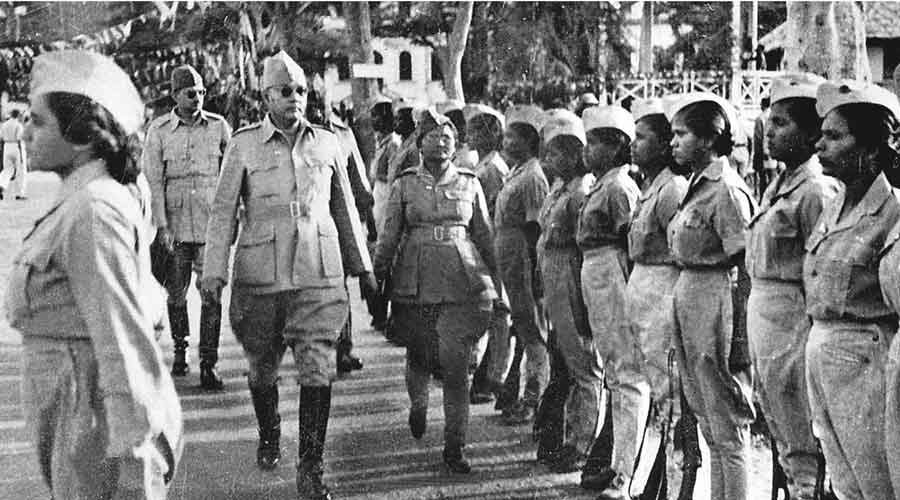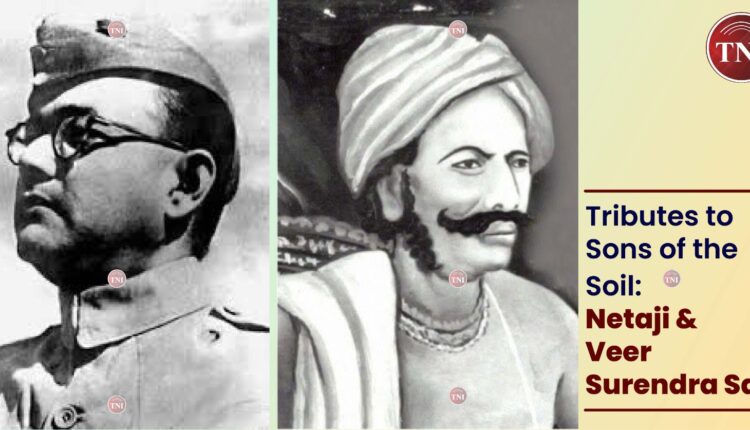Tributes to Sons of the Soil: Netaji Subhas Chandra Bose & Veer Surendra Sai
Among these illustrious figures, two names shine brightly—Netaji Subhas Chandra Bose and Veer Surendra Sai.
India’s long and arduous struggle for independence is studded with the sacrifices and heroics of many brave souls who stood tall against oppression and injustice. Among these illustrious figures, two names shine brightly—Netaji Subhas Chandra Bose and Veer Surendra Sai. These sons of the soil are celebrated not just for their extraordinary bravery but for the indomitable spirit that fueled their tireless fight for the freedom and dignity of their motherland. Their lives, though lived in different eras and under distinct circumstances, converge on a common theme: unwavering dedication to the cause of the oppressed and an unrelenting determination to uproot tyranny.
Netaji Subhas Chandra Bose
Netaji Subhas Chandra Bose remains one of the most iconic figures in India’s freedom struggle, a leader who redefined the very essence of patriotism. Born in Cuttack, Odisha, on January 23, 1897, Bose was a prodigious child whose brilliance shone through his academic pursuits. Yet, despite securing a promising future with the Indian Civil Service, his heart yearned to serve his country in its darkest hour. His resignation from the civil service marked the beginning of a revolutionary journey that would inspire millions.
Unlike the conventional methods adopted by many leaders of the time, Bose believed in a more assertive approach to securing India’s independence. His fiery speeches and audacious strategies made him a force to be reckoned with. As the leader of the Indian National Army (INA), Bose’s vision of “Purna Swaraj” (complete independence) was one that resonated deeply with the masses. He united people across caste, creed, and religion under the rallying cry of “Jai Hind,” a slogan that continues to ignite patriotic fervor to this day.

Netaji’s call, “Give me blood, and I will give you freedom,” was more than a slogan—it was a profound testament to his commitment to freedom at any cost. His collaboration with Axis powers during World War II and his daring escapades across countries showcased his willingness to explore uncharted paths for the greater good of India. Though his mysterious disappearance remains one of history’s unresolved enigmas, his legacy as a visionary leader and an unwavering patriot remains etched in the nation’s collective memory.
Veer Surendra Sai
Support Independent Journalism? Keep us live.
Long before Netaji’s era, another luminary was fighting a valiant battle against foreign domination. Veer Surendra Sai, a fearless leader from Sambalpur, Odisha, waged one of the earliest and most enduring struggles against British imperialism. Born on January 23, 1809, into the royal family of Sambalpur, Sai could have led a life of privilege and comfort. Instead, he chose to champion the cause of his people, sacrificing personal comforts for the collective good.
Sai’s rebellion against the British began in the mid-19th century when he opposed their unjust interference in the succession of the Sambalpur throne. Refusing to bow to colonial exploitation, Sai led an armed resistance that lasted decades, relying on guerrilla warfare tactics to outsmart the British forces. His operations in the dense forests of western Odisha became legendary, as he evaded capture while continuing to inspire and mobilize his followers.

What sets Veer Surendra Sai apart is not just his military genius but his compassion for the common people. He fought to protect the rights of farmers and tribal communities, who bore the brunt of British exploitation. His life was marked by immense personal sacrifice—he spent 37 years in prison, including long years of solitary confinement, yet his resolve never wavered. To this day, he is remembered as a hero who placed the well-being of his people above everything else.
The lives of Netaji Subhas Chandra Bose and Veer Surendra Sai exemplify the extraordinary resilience and courage that characterize India’s struggle for independence. While Netaji envisioned a modern, powerful India that would command respect on the global stage, Sai’s grassroots resistance laid the foundation for future movements against colonial exploitation. Both leaders remind us that freedom is neither a gift nor a privilege—it is a right, earned through relentless struggle, sacrifice, and an unyielding commitment to justice.
As we celebrate these sons of the soil, we must also reflect on the ideals they upheld. Netaji’s vision of a united and self-reliant India and Sai’s commitment to protecting the oppressed are not just historical lessons but enduring calls to action. Their sacrifices demand that we remain vigilant in safeguarding the values they fought for—equality, justice, and unwavering dedication to the welfare of the nation.
In honoring Netaji Subhas Chandra Bose and Veer Surendra Sai, we do more than commemorate their heroics; we renew our pledge to build an India that mirrors their dreams—a land where courage thrives, and freedom is cherished. Their stories, immortalized in the annals of history, will continue to inspire generations to rise above fear and adversity, carrying forward the legacy of these indomitable warriors.


Comments are closed.